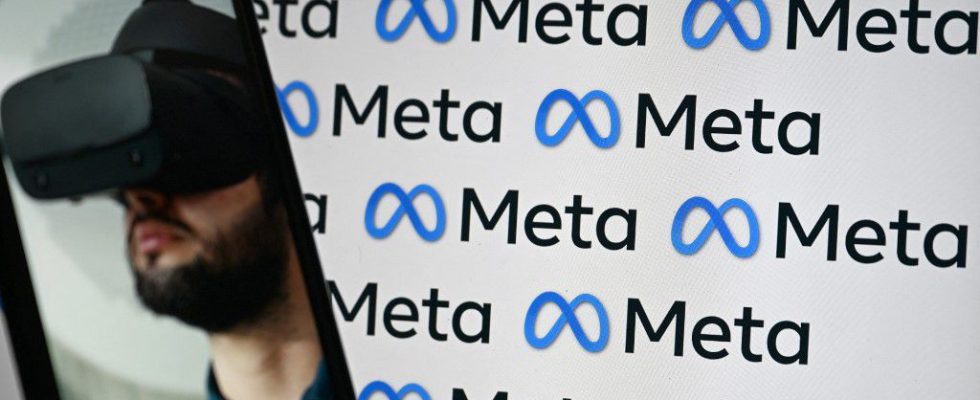A recent video published on his Instagram account testifies to Mark Zuckerberg’s two current obsessions. We see the boss of Meta accompanied by Mike Davis and Max Holloway, professionals in MMA (mixed martial arts), this combat sport that he loves to the point of wanting to face his rival Elon Musk. Very quickly, the three men put on the brand’s new helmet, the Quest 3, and immerse themselves in Super Rumblea shooting game integrated into Horizons Worlds, the “metaverse” of the firm. A way of reminding us that “Zuck” also remains driven by his ambitions in this area, despite the disinterest of investors as well as the massive losses incurred by his Reality Labs division ($13.72 billion in 2022). And even more, despite Apple’s thunderous arrival on the market, with the Vision Pro, a “spatial computer” which, thanks to augmented reality (AR), reveals the physical world through cameras located at the front of the device. A less isolating option for working without being cut off from your environment, unlike the 100% virtual (VR) so far favored by Meta.
The official release of Quest 3, this Wednesday, September 27, during the Meta Connect event, is also part of this technological path. The device is the second “mixed” headset (AR and VR) from the Menlo Park firm, but the first truly intended for the general public. As with Apple, it is a safe bet that so-called “augmented” applications will be highlighted during the demonstrations. A strategic reversal? “The headset market is still young and developing. Above all, Meta wants to give itself the means to address all uses,” analyzes digital strategy expert Morgane Soulier. “Every demo they showed was a person sitting alone on a couch. That could be the vision of the future of computing, but it’s not the vision I want,” Mark Zuckerberg criticized in June , discovering the Vision Pro. His video also seems to indicate that a change of course is not really on the agenda.
“Sense of history”
Meta has good reasons to chart his course. The company remains a solid leader in this sector. At the start of 2023, it represented around 50% of headset sales worldwide, according to figures from IDC (8.5 million sales are expected this year). It dominates both the entry and mid-range: the Quest 3 will be sold for 549 euros in France. The very high end on which Apple is positioning itself – the Vision Pro will be six times more expensive – will not arrive in stores before 2024, and initially in the United States. “Apple tends above all to make its headset accessible to developers in order to build its ecosystem,” believes Morgane Soulier. Apart from Sony, whose headset is intended to equip players with its Playstation 5, “Meta is mainly competing in BtoB (sales to professionals) by players like HTC, Pico, or more recently Lynx”, notes Alexandre Bouchet, president Laval Virtual, an annual event specializing in virtual reality. When it comes to mainstream entertainment – the mass market – no one does it better than him to this day.
Virtual worlds, Meta’s real bet, are still popular. “It is not because we stop focusing on it that the notion of metaverse has completely disappeared,” points out Jacques Baranger, director of the division dedicated to this innovation within the Talan group and member of the administration committee of the Metaverse Observatory. Applications like Fortnite, Roblox or Minecraft, which are both social and immersive and which therefore fall within this definition, attract several tens of millions of users, and are constantly growing.” An opinion shared by Morgane Soulier. “We must remember that Travis Scott’s concerts on Fortnite during the Covid crisis had more than 20 million spectators. That’s the gist of the story.” The idea of Meta is therefore to make its own metaverse “cooler”, through titles like Super Rumble, with Fortnite-style “pop” decors. And to attract users of trendy applications more widely to its headsets. From a very young age if necessary. The social media giant in quick succession, in the summer, announced the integration of Roblox into its “Quest” and clarified its wish to lower the recommended age for their use from 13 to 10 years.
Glasses, the real objective?
Mark Zuckerberg and Tim Cook know it: the headset war has only just begun. The market remains tiny. Even if this is expected to triple by 2027 to reach around 30 million copies sold annually according to the IDC firm, this volume will represent for comparison only 2.5% of the current smartphone market. “Its high price remains an obstacle,” observes Jacques Baranger. In a period of inflation, sales also fell by 44% year-on-year, in the second quarter of 2023. And the players are facing significant technological and physical challenges. “Most headsets are still very bulky. The Quest 2, for example, was rather heavy and can cause headaches with prolonged use,” notes Morgane Soulier. Mark Zuckerberg has already announced that his new device will be 40% thinner than its predecessor. But the road is long. “Making each component more solid while miniaturizing requires colossal investments in research and development,” emphasizes Alexandre Bouchet. Only a handful of giants such as Samsung, Microsoft or Google are able to enter the race for the general public market.
So deep down, Mark Zuckerberg is not convinced of the merits of a headset for augmented reality. The Californian firm is already working in this area, with Magic Leap and Ray-Ban, to construct experiences to be displayed on glasses. A format developed internally for several years, under the code name “Nazaré”. According to a media investigation The Verge, for the director of Meta it would be the only possible replacement for the “iPhone”, the modern smartphone. A release date is not on the agenda. If Mark Zuckerberg has learned the lesson of the metaverse, it is very likely that this time, he will not rush its release.
